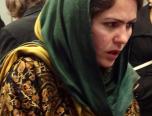Kem Knapp Sawyer
Books for young readers
Blog
A Presidential Candidate for 2014: Fawzia Koofi

Afghanistan’s parliament now has 68 women members, and one of them, Fawzia Koofi, is running for president.
Earlier this week I heard Fawzia speak to the Women’s Foreign Policy Group here in Washington. Her voice, her courage, and her convictions reminded me of several Americans whose stories I’ve told—those who have stood up for the rights of women when there were precious few to be had. Lucretia Mott, one of our country’s earliest pioneers for peace and justice, was a forceful opponent of both war and slavery. A gifted, spirited leader, she organized the Women’s Rights Convention at Seneca Falls in 1848. Harriet Tubman risked her life—time and time again—to free her people. She was a friend to the downtrodden, a master storyteller with a big heart. Abigail Adams and Eleanor Roosevelt not only influenced their husbands—they also changed the world. John Adams’s “dearest friend” may be most famous for her words, “Remember the ladies.” Eleanor Roosevelt considered the Universal of Human Rights her greatest achievement—she preferred to "light candles rather than curse the darkness,” often saying, “Surely, in the light of history, it is more intelligent to hope than to fear.”
Like them Fawzia became an advocate for change.
Born in 1975, Fawzia was the 19th of her father’s 23 children. Her mother was worn out from a long labor—depressed that she had given birth to a girl (boy babies were much favored) and that her husband had taken a young and pretty 7th wife. Fawzia was abandoned, left to lie outside on a rock. She did not die and, after a day, someone had second thoughts and brought her back to her mother—the baby's face was burnt from the sun.
Fawzia grew up in a family where boy children had power—still she convinced her parents to let her go to school (almost unheard of) and later went to university in Pakistan. During the first Afghan war, Fawzia saw her sister and sister-in-law beaten, and her father, a member of parliament, was killed by the mujahideen.
As a young woman, Fawzia promoted girls' education. In 2005 she won her first election. She continues to campaign for better schools accessible to girls as well as for the improvement of living conditions in Afghan prisons and the end to sexual violence. She has risked her life more than once for these causes.
During the talk Fawzia was asked what could be done to promote women's rights in her country. She had a long list:
• See that girls do not lose the right to go to school;
• Ensure that women who are elected to parliament or placed at the negotiating table are not silent, but play an active role;
• Include women on the security council;
• Support women as candidates in the presidential elections, in addition to giving them the right to vote;
• Increase the number of polling stations so that more women (and men) can vote;
• Empower the new generation so that the brain drain will stop—too many of the country's brightest have already fled.
Although Fawzia speaks with great self-confidence she knows none of this will be easy. For every 400 steps forward, she says, women must take 200 back. They face tremendous pressures—some can raise their voices while others cannot. (Even in parliament they may not always be heard—when a woman member speaks chances are her microphone will be shut off.)
Widowed in 2003, Fawzia wrote these words to her two daughters, “Don’t die without achieving something. Take pride in trying to help people, and in trying to make our country and our world a better place.” The letter is published in her book The Favored Daughter: One Woman's Fight to Lead Afghanistan into the Future
Lucretia Mott, Harriet Tubman, Abigail Adams and Eleanor Roosevelt might have written much the same.
